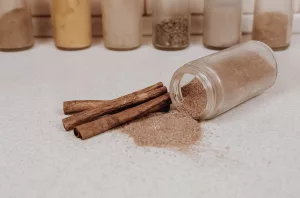Nobody enjoys dealing with the discomfort and inconvenience of diarrhea. It can strike at the most inconvenient times, leaving you searching for relief.
While over-the-counter medications are readily available, many people prefer to explore natural and home remedies for diarrhea.
In this blog post, we’ll discuss several effective and safe home remedies for diarrhea that can help alleviate its symptoms and promote a faster recovery.
Natural Home Remedies for Diarrhea

1. Stay Hydrated
Remaining hydrated is one of the key components in managing diarrhea.
Restoring your body’s fluid balance is essential because diarrhea can cause severe fluid loss.
To avoid being dehydrated, consume plenty of liquids such as fluid, clear soups, herbal teas, and oral rehydration treatments.
Prevent alcohol and coffee because they can make you more dehydrated.
2. Consume BRAT Diet
The BRAT diet is an acronym for banana, rice, applesauce and toast. These bland, readily absorbed foods can aid in firming up stools and lessen gastrointestinal system irritation.
Including these items in your diet can provide relief from diarrhea. Other foods that can be added include plain boiled potatoes, plain yogurt, and boiled carrots.

3. Ginger
Ginger has long been used as a remedy for digestive problems, including diarrhea. It has natural anti-inflammatory and antimicrobial properties that can help soothe the digestive system.
You can consume ginger tea, or ginger candies, or simply chew on small slices of fresh ginger to alleviate diarrhea symptoms.
4. Probiotics
Probiotics are “good” bacteria that promote a healthy balance of microorganisms in the gut.
They can help restore the normal balance of bacteria in your intestines, which can be disrupted during diarrhea.
You can find probiotics in yogurt, kefir, or as supplements, but it’s essential to consult a healthcare professional before starting any new supplement.
5. Chamomile Tea
Chamomile tea is known for its soothing properties and can help reduce intestinal inflammation and cramping.
Sip on a cup of chamomile tea to calm your digestive system and relieve diarrhea discomfort. It’s especially helpful if stress or anxiety triggers your bout of diarrhea.
6. Plain Boiled Rice Water
Boiled rice water is an age-old remedy for diarrhea. Simply boil rice in plenty of water and strain the liquid. Drink the rice water to help reduce the frequency of loose stools and soothe your stomach.
7. Turmeric
Turmeric contains curcumin, a compound with potent anti-inflammatory and antibacterial properties.
You can add a pinch of turmeric to your meals or make a soothing turmeric tea by mixing a teaspoon of turmeric powder with hot water and a bit of honey.

8. Apple Cider Vinegar
Apple cider vinegar can help restore the balance of the gut flora due to its probiotic content.
Mix one to two tablespoons of apple cider vinegar with a glass of water and drink it before meals.
This remedy may help regulate digestion and alleviate diarrhea symptoms.
The Bottom Line
Despite the fact diarrhea can be a troublesome and uncomfortable condition, there are several effective home remedies you can try to alleviate its symptoms and promote a quicker recovery.
Remember to stay hydrated, consume easily digestible foods, and incorporate natural remedies like ginger, chamomile tea, and probiotics into your routine.
However, if diarrhea persists for more than a few days, or if it’s accompanied by severe symptoms such as high fever, blood in stools, or dehydration, it’s essential to consult a doctor for proper diagnosis and treatment.
Disclaimer: The following information is provided solely for informational purposes and should not be considered professional advice or a substitute for professional consultation. While every effort has been made to ensure the accuracy and reliability of the information presented, we make no representations or warranties of any kind, express or implied, regarding the completeness, accuracy, reliability, suitability, or availability of the information provided. Any reliance you place on such details is strictly at your own risk.








